Friday Feb 20, 2026
Friday Feb 20, 2026
Thursday, 2 October 2025 00:40 - - {{hitsCtrl.values.hits}}
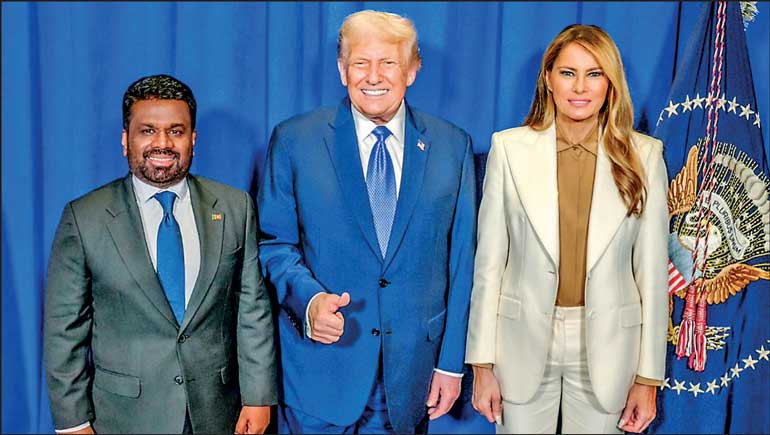
AKD didn’t meet Lula, Petro, Boric, or criticise Israel
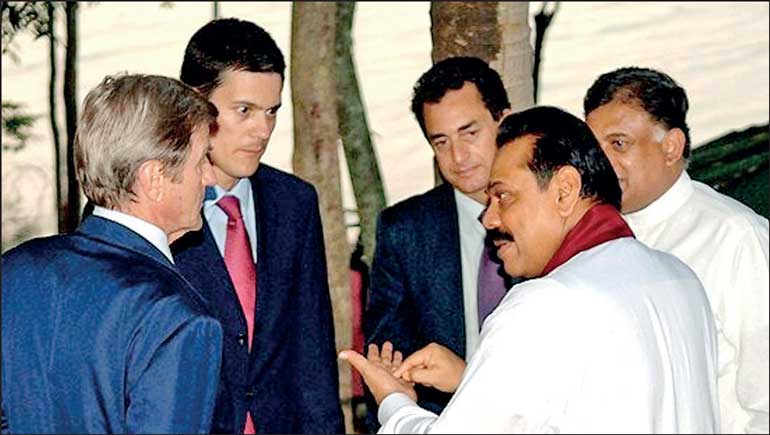
Mahinda rebuffed UK Foreign Secretary Miliband
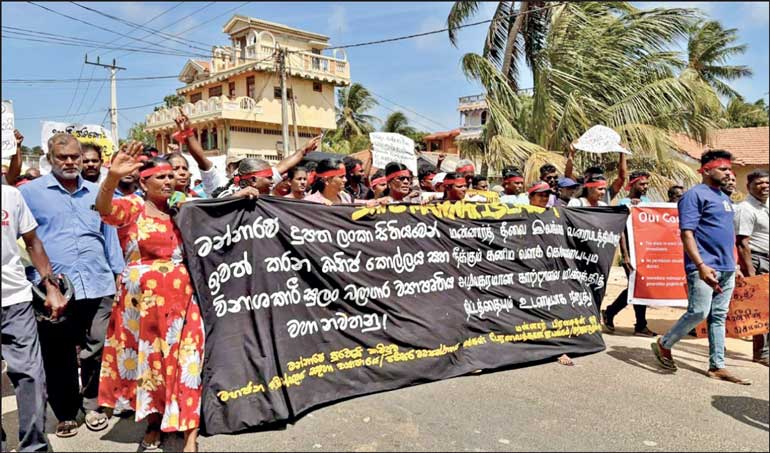
Mannar: Multiethnic, multilingual, multireligious protests against ecological and livelihood destruction
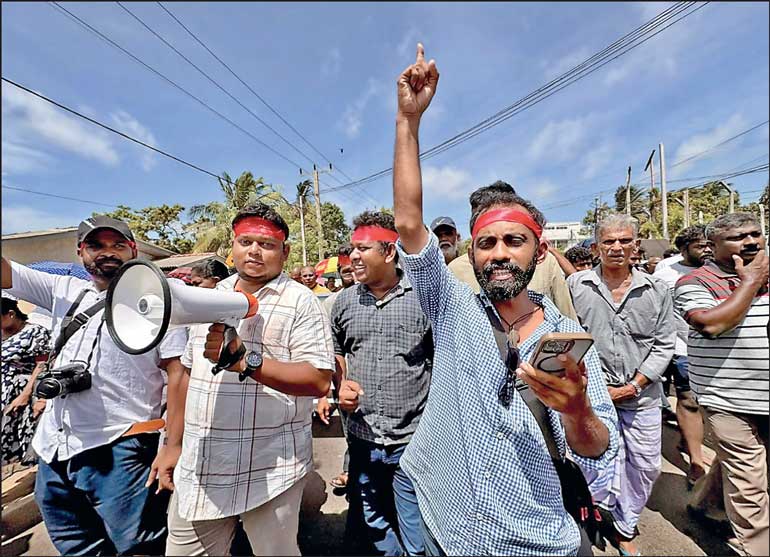
Leftist youth leaders of the Aragalaya join Mannar protest
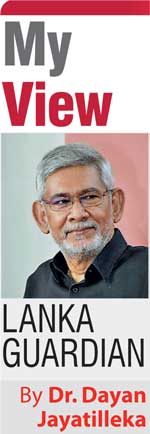 Two former Navy chiefs whose wartime background was in naval intelligence, are incarcerated. The Government insists that it doesn’t decide to arrest anyone and that any such decisions are not taken by the political authorities but have been and are being taken quite independently by state authorities, i.e., state machinery that has been newly rendered independent by the NPP government.
Two former Navy chiefs whose wartime background was in naval intelligence, are incarcerated. The Government insists that it doesn’t decide to arrest anyone and that any such decisions are not taken by the political authorities but have been and are being taken quite independently by state authorities, i.e., state machinery that has been newly rendered independent by the NPP government.
If so, isn’t it a little odd that President Anura Kumara Dissanayake made the following announcement to an audience of Sri Lankans in New York City?
‘…President Anura Kumara Dissanayake said that investigations into the 2019 Easter Sunday bomb attacks are continuing and advancing and that one or two former Army officials are expected to be arrested over the incident…
…”Several former military officials are to be arrested soon and investigations are both continuing and advancing.”…’
National independence, sovereignty
A hallmark of a progressive in the Global South is the defence of national independence and sovereignty. In his speech to Lankans in Japan, Anura announced the retrenchment of military camps in the North on the assumption that enlightened policy can achieve permanent peace. He is unaware that in no country is a successful postwar security posture, a return to a prewar security posture, because the war itself revealed strategic vulnerabilities. He reassures us that in case there is a war, constitutionally the troops can always be sent back. He’s got to be kidding. (https://www.youtube.com/watch?v=JC6_8VCMgrM)
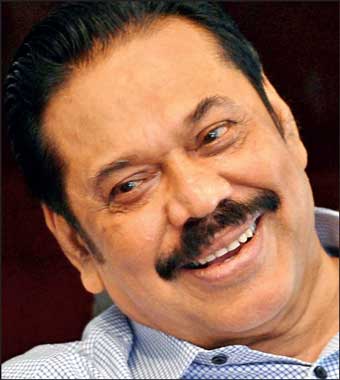 |
| Arafat admirer Mahinda fully solidarised with the Palestinian cause |
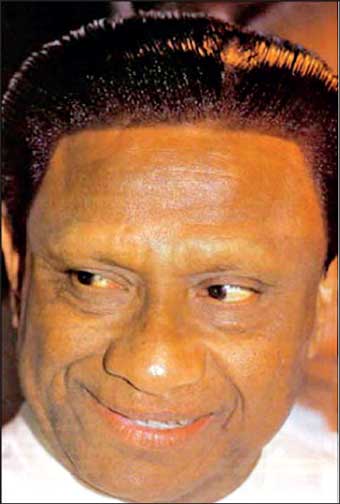 |
| Premadasa defied President Bush Sr. on Zionism, sent Indian troops back
|
Despite the evidence of this island’s long history, AKD is oblivious to dangerous external cross-currents from near and far. Realistic, rational defence strategy and security planning is not based on and derivative of ephemeral domestic politics and policies, but in the axiomatic geopolitical realities that define our island-nation’s existence, namely ‘Who, What and Where we are’ (Mervyn de Silva).
President Premadasa removed an intrusive British High Commissioner and de-coupled a massive Indian military presence. Mahinda pushed-back wartime interference by UK Foreign Secretary David Miliband. But Anura has refused to make public the contents of his administration’s agreements with India. He wouldn’t do that unless there’s something to hide. The multiethnic, multireligious, multilingual agitation in Mannar seems a defensive response to rampant economic Indianisation. (https://www.youtube.com/watch?v=-3VUBZkVxww)
Meanwhile, having avoided the 25th anniversary SCO Summit in China, Anura went to Japan, a member of the Quad, and declared to Japan’s corporates: “Sri Lanka can be your strategic partner to enter South Asia”. Where is Sri Lanka’s traditional ambidextrous balancing? (https://www.ft.lk/top-story/AKD-entices-Japanese-investors-to-Sri-Lanka/26-782398)
JVPer in New York
Among those delivered this year at the UN General Assembly in New York, my favourite speeches were those of three democratically-elected presidents from the Latin American left: Brazil’s Lula, Colombia’s Gustavo Petro and Chile’s Gabriel Boric.
President AKD’s speech didn’t make my short list for several reasons.
 His over-emphasis on drug trafficking, corruption, and religious extremism and racism would have given the impression of Sri Lanka as a place rife with these phenomena, which is hardly accurate and isn’t the negativity one expects from the country’s elected leader. It certainly won’t inspire foreign investors to flood this place.
His over-emphasis on drug trafficking, corruption, and religious extremism and racism would have given the impression of Sri Lanka as a place rife with these phenomena, which is hardly accurate and isn’t the negativity one expects from the country’s elected leader. It certainly won’t inspire foreign investors to flood this place.
 He kept the word ‘Israel’ entirely out of his paragraph on Gaza. If you go only by AKD, it could be anyone – even Martians--causing the ceaseless carnage, the massacre of unarmed women and children, indeed the genocide, there.
He kept the word ‘Israel’ entirely out of his paragraph on Gaza. If you go only by AKD, it could be anyone – even Martians--causing the ceaseless carnage, the massacre of unarmed women and children, indeed the genocide, there.
 The sole appearance of ‘Israel’ in his speech was “We also believe that legal, security and humanitarian concerns of Israel and Palestinian people need to be acknowledged.”
The sole appearance of ‘Israel’ in his speech was “We also believe that legal, security and humanitarian concerns of Israel and Palestinian people need to be acknowledged.”
 His speech omitted something Sri Lanka remained steadfastly committed to for decades: the end of the Israeli Occupation. Anura never used the term ‘the Occupation’, referred to the Palestinian people and territories as ‘occupied’, or Israel as ‘occupier’.
His speech omitted something Sri Lanka remained steadfastly committed to for decades: the end of the Israeli Occupation. Anura never used the term ‘the Occupation’, referred to the Palestinian people and territories as ‘occupied’, or Israel as ‘occupier’.
This must be contrasted with the speech by Chile’s Gabriel Boric who explicitly denounced Israel for perpetrating the massacre of Gazans and the destruction of Gaza.
President Anura Dissanayake chose to quote President Harry Truman towards the closure of his speech. “As President Harry Truman stated on the occasion of founding the United Nations…” If he wanted to quote an American president he could have chosen President Franklin Delano Roosevelt and his ‘Four Freedoms’. Instead Anura chose FDR’s successor President Truman who chose to drop atomic bombs on the entirely civilian, fellow Asian population of Hiroshima and Nagasaki.
AKD didn’t have bilateral discussions on the sidelines of the UNGA with a single democratically-elected progressive leader from Latin America and the Caribbean-- leaders from countries which have experienced the debt trap and are in the forefront of initiatives against it.
Sri Lanka’s Palestine policy
Prime Minister Sirimavo Bandaranaike broke off diplomatic relations with Israel. President Premadasa faced a situation that Anura did, in that his predecessor JR Jayewardene had permitted an Israeli presence and role—though it must be said that President Jayewardene’s government was also among the world’s first to recognize the PLO’s Government-in-exile headed by Yasser Arafat.
President Premadasa shut down the Israeli Interests Section. When highly-influential US Congressman Stephen Solarz flew to Sri Lanka, called on the president and cautioned him that such a closure would have consequences, Premadasa replied “Congressman Solarz, do you think we Sri Lankans believe that actions don’t have consequences? This meeting is now over”. He stood up and left the room.
In 1991, with the US leading a coalition that won the first Gulf War (‘Desert Storm’) and the USSR in meltdown, months away from self-dissolution as a state, unipolarity was dawning in the global order for the first time since the zenith of the British empire. US President George HW Bush addressed the UN General Assembly, reminded it that in 1975 (the height of the Third World’s power) when it had passed a resolution defining ‘Zionism as a form of Racism’, the US had pledged to repeal that resolution. Bush Sr. declared he had come to honour that pledge and insisted the UNGA repeal the 1975 resolution.
The UNGA did so with only 25 states voting against repeal. Of the 25 there was only one that was neither Islamic nor Communist-led. That was Sri Lanka under President Premadasa. He had telephonically instructed our Permanent Representative Prof Stanley Kalpage not to abstain or absent himself “by heading for the bathroom”.
President Premadasa’s view was that the 1975 resolution should have been repealed only after Israel had agreed to the establishment of a Palestinian state, because until then, the denunciation that Zionism was a form of racism would have remained valid. Premadasa has been proven prophetic by Israel’s ongoing genocide of the Palestinians of Gaza.
President Mahinda Rajapaksa was known for his principled and resolute solidarity with Palestine, and personal affection and respect for Chairman Yasser Arafat.
During Israel’s war on Gaza in 2008-2009 (‘Operation Cast Lead’) Sri Lanka was among those prominent in successfully achieving at the UNHRC in Geneva what was sabotaged at the UNGA, New York at the time: pass a Resolution of condemnation. I was Sri Lanka’s Ambassador/Permanent Representative. When an incensed Secretary of Defence Gotabaya Rajapaksa phoned me to rudely demand “who told you to speak condemning Israel?” I replied with complete honesty, “your brother”—with whom I’d had a conversation before the resolution.
A few months later came the US-backed EU resolution against Sri Lanka at the UNHRC which we were able to pre-emptively and decisively defeat with our own. Our defence of the Sri Lankan military’s offensive against the Tigers had added legitimacy in the Council because we had earlier demarcated ourselves from the barbaric behaviour of the Israelis by our prominent role in the resolution on Gaza. All Arab and Islamic (OIC) members elected to the UNHRC voted for Sri Lanka.
Much more historic was Sri Lanka’s role in 2011 in Paris. Prefiguring the UNGA vote last week, the first UN body to vote Palestine in as a new member was the UNESCO in Paris. US Secretary of State Hillary Clinton flew over before the vote and addressed us. I was Sri Lanka’s ambassador to France, accredited to Spain and Portugal, as well as Permanent Delegate to UNESCO. Hillary told us that the US Congress had resolved to cut 60% of America’s funds to UNESCO if it voted to admit Palestine. It posed a daunting challenge because the entry of a new member required a two-thirds majority of the UNESCO membership.
The decisive debate was at the UNESCO Executive Board consisting of 58 ambassadors representing member states. When collectively deliberating on Hillary Clinton’s polite but pointed threat of financial amputation if not decapitation, I spoke up reminding members of a framed quote that we passed on the corridor to the venue, by Jawaharlal Nehru who had said that “UNESCO must serve as the conscience of the world”. My question was: “Are we going to allow funding, i.e., money, to determine that role? How can we put a price on conscience?” Dr. Tissa Vitharana was attending another UNESCO conference pertaining to his portfolio as Science and Technology Minister, accompanied by Prof Sirimali Fernando, head of the National Science Foundation. We arranged for him to address the UNESCO General Conference assembly. Having phoned MR, he made a strong speech recalling President Rajapaksa’s consistent support of Palestine and urged a ‘Yes’ vote.
When the UNESCO general conference voted, Palestine won more than the required two-thirds majority. In a precursor of what was to come in New York 14 years later, France too voted to admit Palestine.
In 2013 when a High Commissioner friendly to Colombo suggested that having just returned from my Paris stint, I should be redeployed to Geneva because Sri Lanka’s majority had collapsed and long-term defeat in facing UNHRC resolutions was highly probable, Gotabaya Rajapaksa unabashedly expostulated that he “had to fly to Tel Aviv to explain” my role in support of Palestine at UNESCO.
Once, when attending the UNGA in New York, Mahinda Rajapaksa insisted that Sri Lanka’s Ambassador/PR cancel a meeting that had been arranged at the latter’s initiative with New York’s Jewish lobby.
Mahinda’s strong commitment to the cause of Palestine earned him the honour of a road named after him by the Palestinian Authority in Ramallah, in the West Bank.
High marks, no Marx
If AKD’s foreign policy is retrogressive rather than progressive, his economic policy is worse. Evaluating Anura’s first year in office, Advocata’s Dhananath Fernando, the popular young preacher of free-market fundamentalism, gives AKD “100 marks” precisely for his preferential options among the choices available to him.
The chief economic ideologue of the leading right-wing economic think-tank commends Anura fulsomely for “maintaining policy continuity in all the critical areas”, and having “accelerated the debt restructuring process, signed most of the debt contracts”. He praises him also for “the digitization drive, getting Dr Hans…”.
Summarising Anura’s first year achievement, Dhananath applauds him and his comrades for the “courage” to embrace exactly what they had opposed.
“Consistency is what they brought in without changing the key reforms…they went to courts against Central Bank independence, but they didn’t change it once they came to power”. (https://www.facebook.com/share/v/1Ck7xaN3RG/)
Can the JVP-NPP ideologues who advocate giving AKD time and the benefit of the doubt, explain why a supposedly leftwing or progressive administration didn’t prefer to invite Lankan-born economist Prof Howard Nicholas, based in a prestigious European university, author of a book on Marx’s economics, occasional consultant in Vietnam, and analyst of Sri Lanka’s foreign debt crisis in a scholarly economics journal, to advise the President and be a chief negotiator? What manner of ‘progressive’ president/govt prefers Nandalal Weerasinghe, Mahinda Siriwardana and Duminda Hulangamuwa instead?
President Ranasinghe Premadasa picked Oxford-educated ex-civil servant, ex-political prisoner and radical-left Third Worldist intellectual Susil Sirivardhana, editor of the Maoist-inclined cultural journal Mawatha, as head of both his emblematic programs, Housing and Janasaviya. Susil co-authored Prime Minister and Presidential candidate Premadasa’s 1988 election manifesto. He was Premadasa’s key ideologue and spokesperson on development policy.
Mahinda Rajapaksa’s long-time ideologue and policy intellectual was Dr Sunimal Fernando, leftwing social scientist and product of the London School of Economics.
How are Anura Dissanayake and his policy troika Nandalal Weerasinghe-Mahinda Siriwardena-Duminda Hulangamuwa, more progressive than Ranasinghe Premadasa and Susil Sirivardhana (or Mahinda Rajapaksa and Sunimal Fernando)?
Speaking to Sri Lankans in New York, there was an interesting moment when Anura was posed a question in English by a senior gentleman, broadly on the issue of social welfare. AKD tossed the question to Foreign Minister Vijitha Herath, high-ranking JVP Politbureau member of long-standing. Vijitha reply was “as you know we are now in a crisis, and we shall proceed to a strong social welfare net in 3-4 years.” (https://youtu.be/Cweagbf26Ms)
So, the economic crisis which disproportionately impacts the poor and the working people including the middle classes, will not have a robust social safety net on the JVP-NPP’s watch, until the crisis is over. This is to the right of the World Bank and UNDP.
Vijitha Herath cannot be chiefly blamed because President Anura Dissanayake said much the same thing in his speech to Sri Lankan New Yorkers:
‘…However, stability, he noted, is only the beginning. The next phase is ensuring that these economic gains “flow down to the ordinary people.”…’
So, the first phase is stability/stabilisation, the next is “economic gains…flowing down to the ordinary people.” (My emphases-DJ)
First come the foreign private creditors, the top local corporates and the wealthiest decile-- the ‘extraordinary’ people ‘up’ there-- and next come ‘the ordinary people’ who are ‘down’ there. If this isn’t trickle-down, what is?
Contrast that with President Premadasa who kicked off the Janasaviya poverty alleviation program in Hambantota, the cradle of the Southern insurgency, at a time of twin civil wars or as he put it “a torch burning at both ends”, South and North, a foreign military presence (which fed the Southern insurgency), and an economy reeling from destruction and sabotage.
He didn’t seek to stabilise first, then grow, then channel the resultant prosperity down to the ordinary people. He led with Janasaviya, reduced absolute and relative poverty, narrowed the inequality gap while accelerating growth, energised the stock-market, attracted foreign investment and launched an export-led, province-based industrialisation drive which is still keeping our economy afloat. Premadasa achieved stabilisation and recovery through ‘growth with equity’.
Provincial devolution
40 years ago (1985), two years before the intrusive Indian airdrop, the Sri Lankan State led by President JR Jayewardene, represented at bilateral talks in Delhi by his brother Harry Jayewardene QC, agreed to the devolution of power within a unitary state to a provincial (no longer district) unit. Legislated in 1987, activated in 1988, it is the most progressive democratic structural reform of the State since Independence.
Snarled-up for years including by the JVP, Provincial Councils are being kept open-endedly unelected and comatose by the AKD-JVP-NPP administration which is silent about provincial devolution, unlike other mainstream parties.
In the core domains I call ‘the 3-Es’-- economic policy, external relations and ethnic autonomy-- the AKD-JVP-NPP Government is way behind most leaderships and governments we’ve had since Independence. It isn’t ‘progressive’, ‘left-oriented’ or ‘centre-left’ by any comparative international or national standard. It is a retrogressive rightward shift; a Great Leap Backward.